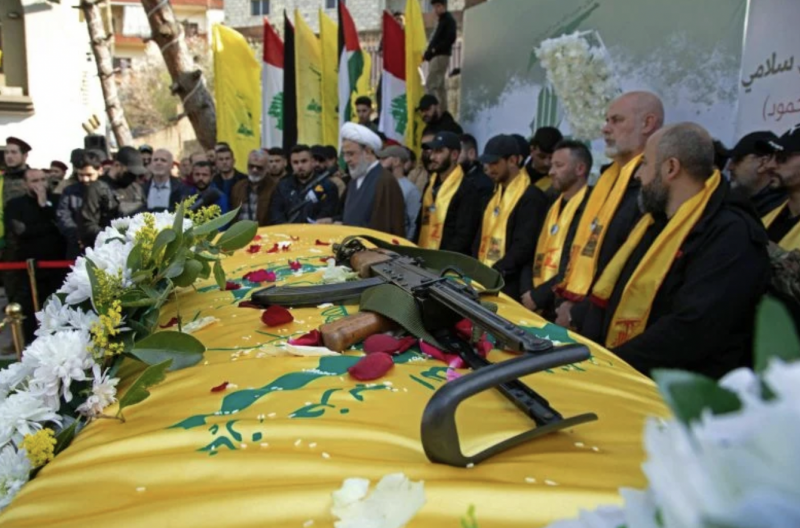
The funeral of a Hezbollah member in south Lebanon on Feb. 27, 2024. (Credit: Hassan Fneich/AFP)
Hassan Nasrallah waited almost a month before making his first speech after Operation al-Aqsa Flood. Why? Because he wanted to preserve a “strategic ambiguity” over Hezbollah’s intentions in this sequence as long as possible. However, once his speech was over, the doubt almost disappeared.
Since Nov. 3, it has been evident that Hezbollah does not want an all-out war with Israel. The party’s officials have reiterated it publicly and behind closed doors for months, to the point that the party ended up losing some of its deterrence against Israel.
Israeli officials are well aware that in 2024, Hezbollah is no longer the same as in 2006, and that the militia has around 150,000 missiles, some of which have a fire range exceeding 100 kilometers.
They are also aware that in the event of war, despite their preparations and enhanced military capacity, Hezbollah will be able to hit them hard and could target major cities and displace hundreds of thousands of people.
Hezbollah still has a deterrence capacity: This is the main reason why Israel has not yet started a large-scale military operation in Lebanon. But the more the weeks go by, the more this deterrence capacity erodes.
The more Hezbollah reiterates that it does not want war, the more Israel allows itself to expand its operations in Lebanon.
Since mid-2010, Israel has regularly carried out raids against “Axis of Resistance” in Syria. Its strikes may target the south of the country, Damascus or even the Syrian coast, although it is Moscow’s stronghold.
Israel does not hold back because it perceives the strong presence of Iran and its allies at its border as a threat and because it is aware that its enemy does not have the means to retaliate.
For years, however, Israel refrained from acting with the same logic on Lebanese soil. That has not been the case because it considered that the threat there was any lower, but rather because it knew that doing so would have consequences.
The situation has changed since Oct.8, when hostilities between the two enemies began following Hezbollah’s strike.
Since then, Israel has been pursuing three objectives in Lebanon: Eliminating Hamas leaders who have taken refuge in Lebanon, eliminating as many members as possible of Hezbollah’s elite al-Radwan unit which focuses on infiltration operations and destroying key targets to weaken its adversary.
Much more to lose
As the weeks went by, Israel broke all rules, bearing in mind that its adversary would do almost anything to avoid war. It took the liberty of assassinating senior Hamas official Saleh al-Arouri in Beirut’s southern suburb. Then it struck Nabatieh, Saida and Baalbeck as if it wanted to show that its operation knows no geographical limits.
Hezbollah certainly retaliated. But most of the time it did so while respecting the “rules of engagement,” which has encouraged Israel to do it again.
Hezbollah is constantly on the defensive, reacting forcibly without being able to reinvigorate and compelled to hope that a truce will be declared in Gaza to break this vicious cycle. Israel, for its part, is already in the mindset of war in Lebanon.
It is carrying out its operation, achieving part of its objectives and preparing the ground for the rest. If diplomacy succeeds, so much the better. If it does not, Israel will probably intensify its operations to the breaking point. The risk for Israel is that it may end up underestimating the threat its enemy poses and engaging in a war that would have major consequences.
For Hezbollah, the stakes are more complex. The party has much more to lose than to gain from an all-out war with Israel. The Lebanese do not want it, including Hezbollah’s popular base, and would not forgive it for that. Even if it managed to “resist” the enemy’s offensive, it would still get its fingers burnt. At the same time, it does not want to give a sense of weakness either at home or at the regional stage.
The “support front” for Hamas looks increasingly like a trap. It has no decisive effect on the continuation of the Israeli offensive on Gaza, but it does put the party — and Lebanon — in danger.
Ideally, Hezbollah would like to come out of this sequence with Hamas still “alive” in Gaza, an agreement with Israel that would strengthen its position in Lebanon and a sort of US recognition of Iran’s role in the region.
But so far, Hamas’ military survival is far from certain and the US-Iran deal seems a long way off. As for the agreement with Israel, it is so intrinsically linked to the situation in Gaza that here too the party depends on Israel’s will. In case the latter decided to continue its operations in south Lebanon, even if a truce is achieved in Gaza, what would Hezbollah do then? In case Hamas is defeated militarily, how can Hezbollah get out of this trap without risking losing everything and without sacrificing itself?
This article was originally published in L'Orient-Le Jour. Translated by Joelle El Khoury.